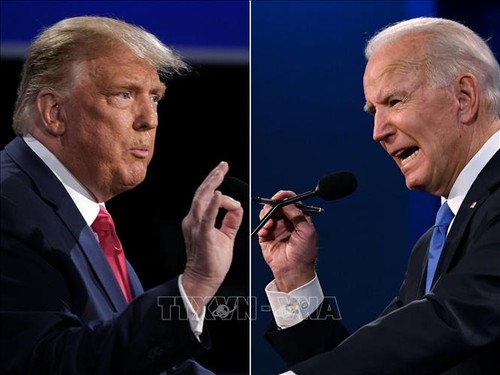|
 US President Donald Trump (left) and Democratic presidential candidate Joe Biden at the final round of live debate in Nashville, Tennessee, October 22, 2020 (US time). US President Donald Trump (left) and Democratic presidential candidate Joe Biden at the final round of live debate in Nashville, Tennessee, October 22, 2020 (US time).
(Photo: AFP/VNA)
|
How much this presidential election will affect the political, security, and economic cooperation between the US and Southeast Asia is squarely in the spotlight.
US “pivot to Asia” strategy
The strategic relationship between Southeast Asia and the US in the past 10 years began with former President Barack Obama’s “pivot to Asia” strategy, which promised to "re-balance the Asia-Pacific", gradually realize a foreign policy of "comprehensive engagement" with Southeast Asia, and rebuild relations with countries in the region. The strategy established a framework for continuous cooperation with Southeast Asian countries, reinforced political and military cooperation with Asia-Pacific allies, and launched the Trans-Pacific Partnership Agreement (TPP).
All these goals were changed after Donald Trump took office in 2017. He withdrew the US from the TPP, which the Obama administration had devoted a lot of effort to achieve. In November of 2017, President Trump initiated an Indo-Pacific strategy to replace Obama's.
Both strategies are based on geopolitical strategic considerations, but Trump's Indo-Pacific strategy favors comprehensive strategic competition to contain China, rather than multilateral cooperation with Asian countries. Experts believe that if Trump is re-elected, he will continue his containment policy toward China, and Southeast Asian countries will have to balance between these two powers.
If Democratic presidential candidate Joe Biden is elected, experts say, on the one hand, one of his priorities will be to restore the "multilateralism" and "regionalism" which the Trump administration has erased and return the US to a free trade agenda. These alternatives are of great concern to Southeast Asian leaders, even though they have repeatedly said they have no intention of taking sides between China and the US.
Does the US want to assert its influence in Southeast Asia?
Will Joe Biden become a second Barack Obama if he wins the election? If Biden wins, he will still have to deal with effects of Trump's Asia-Pacific policy. But Biden or Trump, whoever wins will need to develop a new foreign policy that is better suited to the situation.
The US government wants a foreign policy more beneficial to Americans, and certainly Southeast Asia, with its important geostrategic position and its engagement and adaptability, will be a big part of any calculations the US make to maintain its role as a global leader.